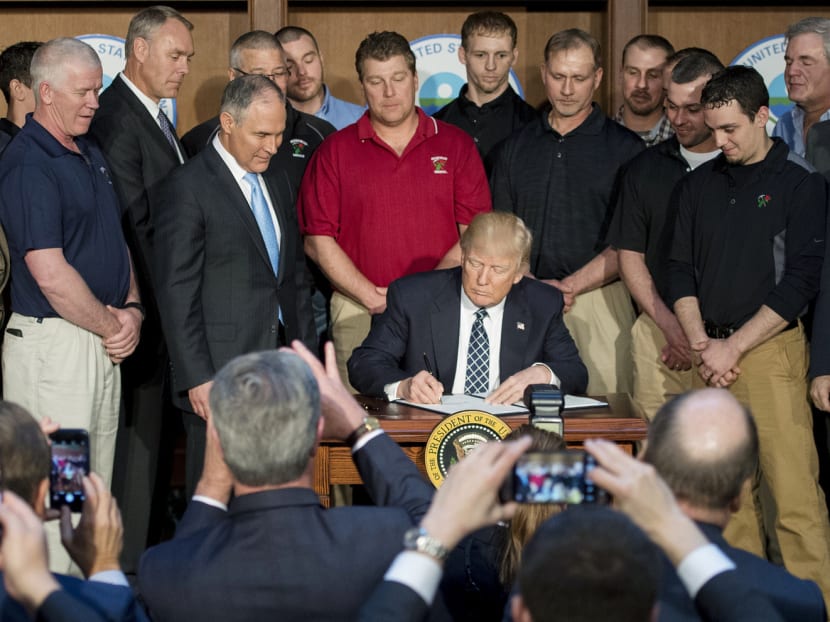US reversal of climate change policies ‘will dim Paris pact’s promise’
WASHINGTON – By signing a long-promised executive order to nullify his predecessor’s climate change efforts and revive the coal industry, United States President Donald Trump has also cast a shadow over the implementation of the landmark Paris climate change agreement.

Surrounded by miners, President Trump signs the Energy Independence Executive Order at the Environmental Protection Agency headquarters on Tuesday. Photo: AFP
WASHINGTON – By signing a long-promised executive order to nullify his predecessor’s climate change efforts and revive the coal industry, United States President Donald Trump has also cast a shadow over the implementation of the landmark Paris climate change agreement.
Although Mr Trump has yet to decide to formally withdraw his country from the accord, experts said that by rolling back the policies needed to meet American commitments, the US essentially announced that it would not comply, regardless of whether the nation remains a signatory or not.
Diplomats from some of the world’s other major economies say they intend to continue carrying out their climate change agreements, with or without the US. Singapore, for example, ratified the Paris Agreement last September, formalising its pledge to reduce emissions intensity by 36 per cent from 2005 levels by 2030. It also committed to reducing the use of factory-made hydrofluorocarbon gases to help slow climate change.
But some experts are worried that the Trump administration’s move will embolden opponents of climate action around the world.
“One of the greatest concerns is what other key countries, including China, India and Brazil, will do when the US reneges on the Paris Agreement,” said Professor Robert Stavins, an expert on environmental economics at Harvard, mentioning some of the world’s other largest carbon dioxide polluters. “The worst-case scenario is that the Paris Agreement will unravel,” he said. “That would be a great tragedy.”
Overall, the goal of the Paris deal is to keep the planet from warming more than 3.6°F, the point at which scientists say the earth will be irrevocably locked into a future of severe droughts, floods, rising sea levels and food shortages.
Mr Trump’s predecessor, Mr Barack Obama, pledged that the US would cut its emissions about 26 per cent from 2005 levels by 2025. Carrying out the Clean Power Plan was essential to meeting that target.
But Mr Trump signed an executive order on Tuesday (US local time) to begin the lengthy legal process of withdrawing and rewriting the plan, which would have closed hundreds of coal-fired power plants, and frozen construction of new plants and replaced them with wind and solar farms.
“This is not the time for any country to change course on the very serious and very real threat of climate change,” said Mr Erik Solheim, executive director of the United Nations Environment Programme.
“The science tells us that we need bolder, more ambitious commitments.”
At the heart of the Paris accord was a breakthrough 2014 agreement between Mr Obama and China’s President Xi Jinping, in which the leaders of the world’s two largest polluting countries agreed to enact policies to cut their emissions.
Their hard-won deal was seen as the catalyst to bring other countries to the table to forge the Paris pact. If Mr Trump reneges on his predecessor’s commitment, it could further fray a relationship that has become more tenuous since his election.
Although Mr Xi has signalled that he is prepared to move forward with his Paris pledge that China’s emissions will drop by or before 2030, experts said without action from Washington, Beijing’s efforts to curb emissions may slow.
“It may empower business and political interests within China that still opposed climate action,” said Mr Alex Wang, a legal scholar of Chinese environmental policies at the University of California, Los Angeles.
The same dynamic could play out in India, the world’s third-largest carbon dioxide polluter. Prime Minister Narendra Modi worked closely with Mr Obama on climate change policies, but he did so against internal domestic pressures to prioritise economic development — including the provision of cheap coal-fired electricity to India’s rural poor.
Mr Harsh Pant, a research fellow at the Observer Research Foundation, a think-tank in New Delhi, said Mr Trump’s order would give the Indian government political space to delay some of its climate commitments.
“It will slow down a little bit,” he said. AGENCIES






